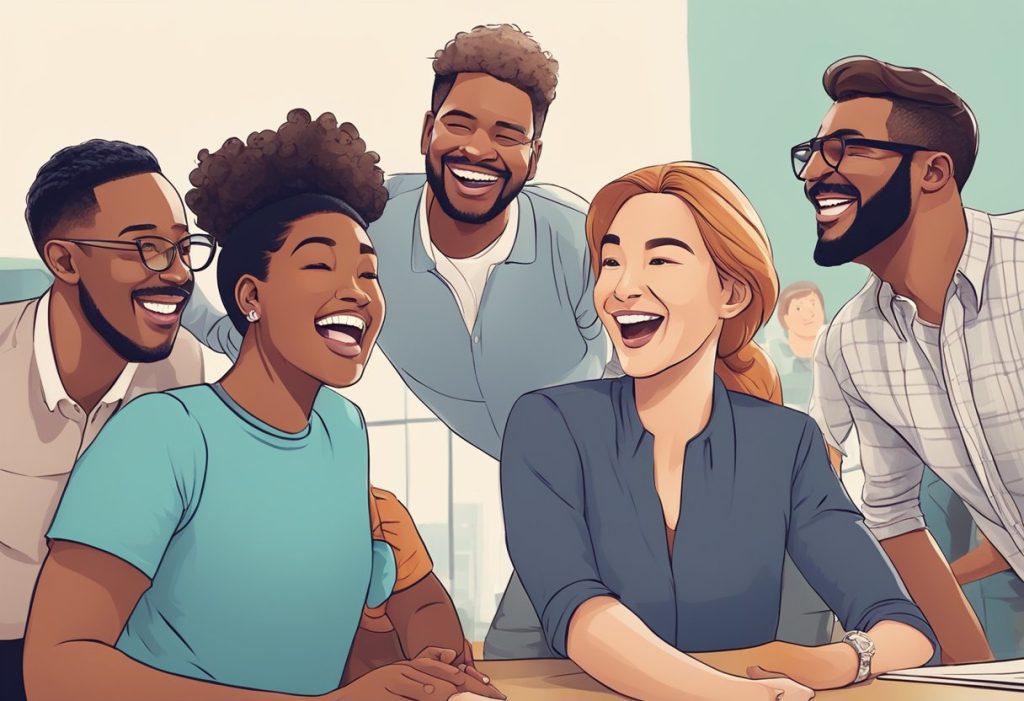When you buy through our links, we may earn a commission. Learn more.
Creating a fun and engaging workplace is essential for promoting strong company culture and boosting employee morale. Engaging in fun activities at work can greatly enhance team building and employee engagement. From quick office games to more elaborate team-building exercises, these activities can make a significant difference in how employees feel about their jobs and interactions with their colleagues.
At Best Kidult, we believe that the right activities can transform a workplace, making it more enjoyable and productive. For instance, participating in team-building exercises like personality tests or mystery games can help coworkers understand each other better and improve collaboration. Such activities not only break the routine but also foster a sense of community and teamwork.
Whether it’s a simple game like “Two Truths and a Lie” or an elaborate scavenger hunt, incorporating fun activities into the workday helps create a positive environment where employees feel valued and connected. Check out some of the best strategies we’ve discovered for boosting employee engagement through fun and interactive activities that everyone can enjoy.
Cultivating Collaboration and Team Synergy
We can strengthen team collaboration, communication skills, and overall teamwork by engaging in various interactive activities. These exercises focus on solving problems together, fostering creativity, and building trust through shared experiences.
Interactive Team Building Games
Interactive team building games are essential in promoting collaboration and enhancing communication skills. One popular game is the Helium Stick, where team members must lower a stick to the ground using only their fingers. This exercise improves coordination and cooperation.
Another effective option is the Human Knot, where participants stand in a circle, grab hands across the group, and then attempt to untangle without letting go. The game highlights the importance of communication and problem-solving.
Simple icebreaker games like charades also help to break the monotony and promote active participation. These games require players to use their creativity and quick thinking, which helps to improve team dynamics.
Creative Group Challenges
Creative group challenges push us to work together and think outside the box. One activity is Paintball, which not only requires strategic planning but also boosts leadership and teamwork. Teams must coordinate their actions to succeed, making it a dynamic and engaging experience.
Another fun challenge is creating and flying paper planes. Each team designs a plane, and the one that flies the farthest wins. This challenge enhances creativity, encourages friendly competition, and requires effective communication within the team.
Brainstorming sessions for solving workplace issues also fall under this category. These sessions offer a platform for everyone to contribute ideas, fostering an environment where all voices are heard, and innovative solutions are found.
Building Trust Through Shared Experiences
Shared experiences are crucial for building trust and camaraderie among team members. Activities like Team Bonding Bingo help us learn interesting facts about each other in a fun and relaxed setting. This game breaks down barriers and builds a sense of closeness.
Outdoor adventures like hiking or team retreats are also effective in strengthening bonds. When we face challenges together outside the work environment, it builds resilience and trust, which translates back into the workplace.
Participating in volunteer projects as a team is another excellent way to build relationships. Working together for a common cause promotes a sense of unity and purpose, enhancing overall team synergy.
Enhancing Professional Development
We can boost professional development at work through activities focused on skill-building, promoting positive office culture, and engagement and recognition strategies. These approaches not only help improve individual strengths but also foster effective communications and teamwork.
Skill-Building Activities
Skill-building activities are essential for improving employees’ abilities and productivity. One popular activity is The Art of Storytelling, which helps employees learn the skill of persuasive storytelling to inspire action. According to Teambuilding.com, participants learn how to share personal narratives that both inform and entertain their audiences.
Another effective activity includes hosting Debates, which can develop impressive communication and leadership skills. Dividing teams and assigning various topics encourages critical thinking and improves public speaking. Referencing Teambuilding.com, debates are useful for developing well-rounded leaders.
We also find value in activities like problem-solving workshops which help enhance teamwork and collaboration. These activities encourage brainstorming and creative solutions to workplace challenges, making employees feel more competent and confident.
Promoting Positive Office Culture
Creating a positive office culture is vital for employee satisfaction and overall productivity. Mix n’ Mingle is an engaging activity that helps build meaningful connections among coworkers. As described on Teambuilding.com, this activity involves a 90-minute session led by an experienced host to boost networking skills.
In addition, implementing fun activities like Two Truths and One Lie can help colleagues learn new facts about each other, fostering a more comfortable and safe working environment. BetterUp emphasizes how these activities can improve team dynamics by encouraging openness and trust.
Promoting office culture also involves recognizing individual personalities and strengths. Activities that highlight unique talents and contributions help build morale and a stronger sense of appreciation and belonging within the team.
Engagement and Recognition Strategies
Engagement and recognition play a crucial role in professional development by boosting job satisfaction and morale. To engage employees, we can use team-building games and puzzles that develop teamwork, communication, and critical thinking skills. These activities, as mentioned on SnackNation, can be adapted for physical, hybrid, or virtual workplaces.
Recognition strategies should also include employee appreciation programs. Regular acknowledgments of achievements and milestones can significantly enhance morale and retention rates. Simple actions like personalized thank-you notes or public recognition during meetings can make employees feel valued.
Lastly, developing a system of peer-to-peer recognition can help create an environment of continuous appreciation and support. Encouraging colleagues to recognize each other’s efforts builds a positive and engaging company culture, ultimately leading to higher levels of job satisfaction and productivity.
I’m Cartez Augustus, a content creator based in Houston, Texas. I’ve been exploring a variety of niches in content marketing in order to increase website traffic. I enjoy experimenting with artificial intelligence, search engine optimization, and paid search. The process of creating nerd-related content has been extremely rewarding since it has enabled me to network with people who are knowledgeable about these subjects.



